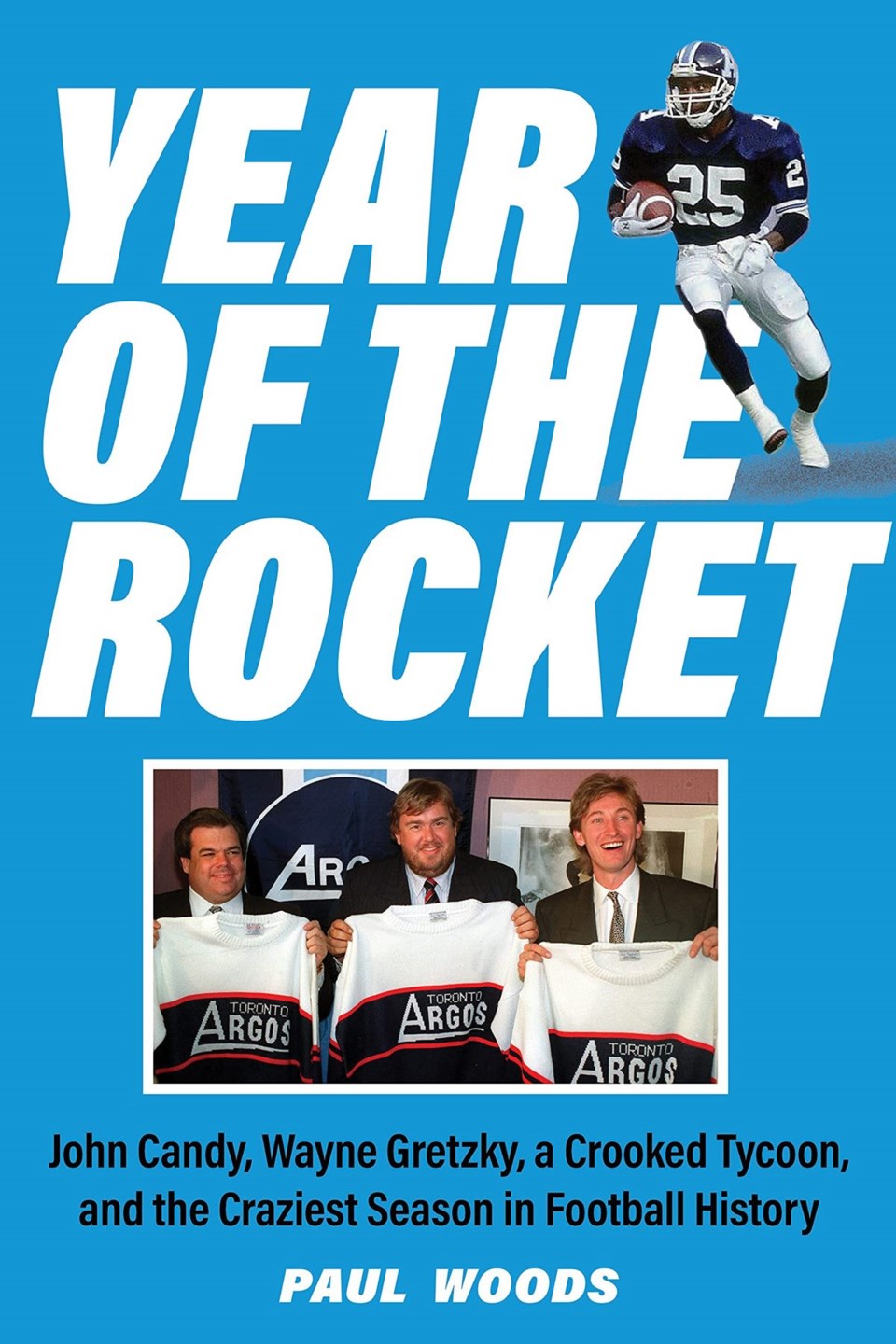Since I also happen to like to read – to the tune of some 52 a year (yes I track that at www.goodreads.com a site well-worth checking out – I’m always happy to find a new book on the CFL.
Of course CFL books are only slightly scarcer than the proverbial hen’s tooth, which is to say there are not a lot out there.
Last year there was however the fine read The Baltimore Stallions: The Brief, Brilliant History of the CFL Champion Franchise by Ron Snyder I had the opportunity to review in this space.
And, now along comes Year of the Rocket: The Wildest Football Season Ever by Paul Woods.
The book is about one of the most unlikely years in the long history of the Toronto Argonauts.
“The century-old Toronto Argonauts, like the rest of the Canadian Football League, seemed to be in shambles in 1991,” details the Sutherland House publisher page to the book.” Then everything changed. The Argos were acquired by an unlikely trio: the greatest hockey player of all time, Wayne Gretzky; a universally beloved comic genius, John Candy; and an upstart sports magnate, Bruce McNall, whose apparent Midas touch masked dark secrets.
“They audaciously swiped from the NFL the most-hyped college athlete in years, Rocket Ismail, by signing him to the richest football contract ever, and set their sights on a league championship. Candy’s friend Dan Aykroyd summoned the Blues Brothers band to fly in from Europe and perform, along with Candy, Jim Belushi, and Mariel Hemingway, at the Rocket’s first game. And the season only got crazier from there…
“Year of the Rocket is the untold saga of one of the greatest gambles in sports history, and one of the most unforgettable seasons on any gridiron, brought to life by a veteran sportswriter who combines meticulous research with the perspective and passion of a lifelong fan.”
Given the cast of characters involved, in particular the triumvirate of owners, author Woods had rather fertile soil from which to raise a book.
Gretzky is a Canadian sports icon, Candy one of its best-loved actors, and McNall a smooth talking con-man, so the off-the-field tale is in many ways the meat of the story.
Yet, the on-field Argos had its cast of characters too; the emerging long-term face of the team Pinball Clemons, the hard-nosed QB Matt Dunigan who went as far as any player ever should to play a Grey Cup game – maybe farther, and of course Ismail.
Ismail was supposed to arrive from the UD game and simply ‘be’ the greatest player the CFL had ever seen.
Of course that never happens. The CFL is better than that, and different enough you don’t just show up and star – not Vince Ferragamo, or Billy ‘White Shoes’ Johnson, or Ismail.
Ismail had a solid season, made an heroic play in the Grey Cup, and generally was ill-suited to be the ‘face’ of the Argos and CFL.
But, in the end the team succeeded, and then the bubble burst, with McNall soon headed to jail, Gretzky disgruntled, Candy dead, the Argos sold and the team plummeting in the standings.
It was a storyline Woods, author of an earlier Argo book Bouncing Back: From National Joke to Grey Cup Champs about the 1983 team, knew he had to turn into his second CFL book.
“I always wanted to read a book about the 1983 Argonauts,” he said, adding since there was not one he asked himself “why not me” completing the book in 2013, the 30th anniversary of the Cup winning season.
That book was a struggle to get published with a couple of “nibbles” from publishers who ultimately said it as too narrow a market, (wish I’d seen it), so Woods self-published.
But Woods said that effort had him interested in writing more.
“I got the bug for writing long form,” he told yours truly.
And the story of Ismail wasn’t too interesting not to pursue with its cast of larger than life characters.
Sadly, two of the main characters did not contribute directly to the more than four years of research Woods put into the book.
Candy had died in 1984, not long after McNall had essentially fire-saled the Argos in front of the eventual collapse of his house-of-cards finances.
Woods said he thought a lot about Candy over the project adding he essentially “became to hero of the story,” and also “a very sad element of the story.”
“He really loved this team” said Woods.
The other non-direct voice was Ismail, the reluctant ‘superstar’ of the Argos.
“I spent 14-months trying to get him to talk to me,” said Woods. “I would have liked to hear his words, his perspective.”
But, Ismail ultimately declined, which ended up being good and bad in terms of the project, suggested Woods.
As a player Ismail was always reluctant to being in the spotlight, so choosing not to speak for the book was actually ‘in-character’.
“He always resisted making himself the focal point,” said Woods.
But, there was also a freedom in telling the story without Ismail talking directly, offered Woods.
In the end Woods created a book that is part football, the on-field success of a flamboyant and talented Argo team with the eyes of the sport set squarely upon them.
And, there is the off-field tale of three-unlikely owners, who for a short-time seemed to offer the CFL the chance to become something larger than ever dreamed.
Entwined together the dual storylines make this a book bigger than football, and one every CFL fan should read.

